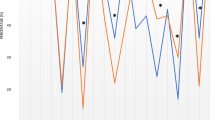Abstract
Background
Paediatric urology training is not a mandatory part of higher surgical training in urology in Ireland. It is predicted there will be a shortfall of surgeons trained in paediatric surgery in the coming years leading to a reliance on specialist paediatric surgical centres.
Aim
The aim of this study was to assess the attitudes of urological trainees regarding the current state of paediatric urology training and to address the potential future changes to training structures.
Methods
A voluntary anonymous internet-based survey was emailed to all urological trainees. Parameters assessed included sex, level of training, attitudes towards paediatric urology training and levels of competence regarding core paediatric urological procedures.
Results
69.2 % (n = 18) responded to the survey. 94.4 % (n = 17) would favour mandatory paediatric training—of these, 52.9 % (n = 9) would favour this in a dedicated paediatric hospital with a paediatric urologist. 66.7 % (n = 12) would like to provide a paediatric urology service as a consultant. 55.6 % (n = 10) felt they were competent to perform circumcision or scrotal exploration independently and manage all associated complications. No trainee felt themselves to be competent to perform orchidopexy independently and manage all complications.
Conclusion
Our study demonstrates a promising desire to provide paediatric services in the future. A greater emphasis on structured paediatric urology training is required to maintain the standard currently offered by adult urologists.
Similar content being viewed by others
References
Boyle E, Walsh SR, Grace PA (2012) The delivery of general paediatric surgery in Ireland: a survey of higher surgical trainees. Ir J Med Sci 181(4):459–462
Kiely E, Jones N (2013) Delivering general paediatric surgery in Ireland: how to avert a crisis? Ir J Med Sci 182(4):743
O’Kelly F, Fanning DM, Elamin S, et al (2014) Trends and attitudes towards paediatric circumcision in the South of Ireland. Ir J Med Sci (Epub ahead of print)
Nason GJ, O’Kelly F, Burke MJ, et al (2014) Paediatric orchidopexy: a need for dedicated paediatric surgical training among urologists? Ir J Med Sci (Epub ahead of print)
Gow KW, Drake FT, Aarabi S et al (2013) The ACGME case log: general surgery resident experience in pediatric surgery. J Pediatr Surg 48(8):1643–1649
Rushton HG (2005) Subspecialty certification in pediatric urology. J Urol 173(6):1845–1846
Zgraj O, Clarke Moloney M et al (2010) Provision of general paediatric surgical services in a regional hospital. Ir J Med Sci 179(1):29–33
Rhee D, Papandria D, Yang J et al (2013) Comparison of pediatric surgical outcomes by the surgeon’s degree of specialization in children. J Pediatr Surg 48(8):1657–1663
Pye JK, Association of Surgeons of Great Britain and Ireland (2008) Survey of general paediatric surgery provision in England, Wales and Northern Ireland. Ann R Coll Surg Engl 90(3):193–197
Mullan MJ, Grannell M, Dick AC (2014) General paediatric surgery: a survey of Northern Ireland general surgery specialist registrars. Ulster Med J 83(1):50–51
Craigie RJ, Duncan JL, Youngson GG (2005) Children’s surgery performed by adult general surgeons in Scotland: the present and future. Surgeon 3(6):391–394
Mickelson JJ, Macneily AE, Samarasekera D et al (2008) Competence in pediatric urology upon graduation from residency: perceptions of residents, program directors and pediatric urologists. Can Urol Assoc J 2(3):205–210
Woodhouse CR (2005) Which pediatric urological conditions can be handled by adult urologists? Nat Clin Pract Urol 2(4):152–153
Shabbir J, Shah MA, Nissar A et al (2005) Non-orthopaedic paediatric trauma in a regional hospital. Ir J Med Sci 174(4):23–27
Coakley DN, Grace PA (2007) General paediatric surgery in Ireland: a crisis in evolution. Ir J Med Sci 176(4):249–251
O’Donovan A, Varadaraj H, Delaney PV et al (2001) The future of paediatric surgery outside specialist paediatric hospitals. Ir J Med Sci 170(4):228–230
Issues in professional practice general paediatric surgery. Association of surgeons of Great Britain and Ireland. December 2013
Author information
Authors and Affiliations
Corresponding author
Rights and permissions
About this article
Cite this article
Burke, M.J., Nason, G.J., Aslam, A. et al. Paediatric urology training: what does the future hold?. Ir J Med Sci 184, 637–640 (2015). https://doi.org/10.1007/s11845-014-1192-2
Received:
Accepted:
Published:
Issue Date:
DOI: https://doi.org/10.1007/s11845-014-1192-2




